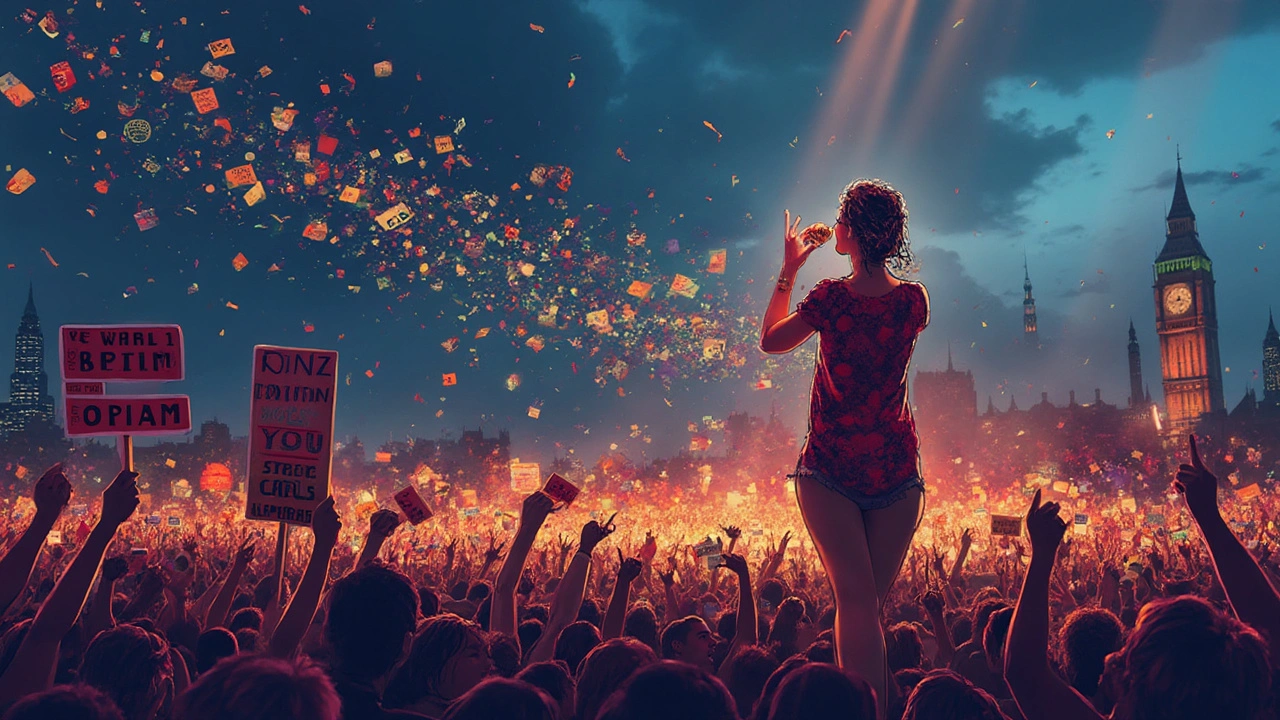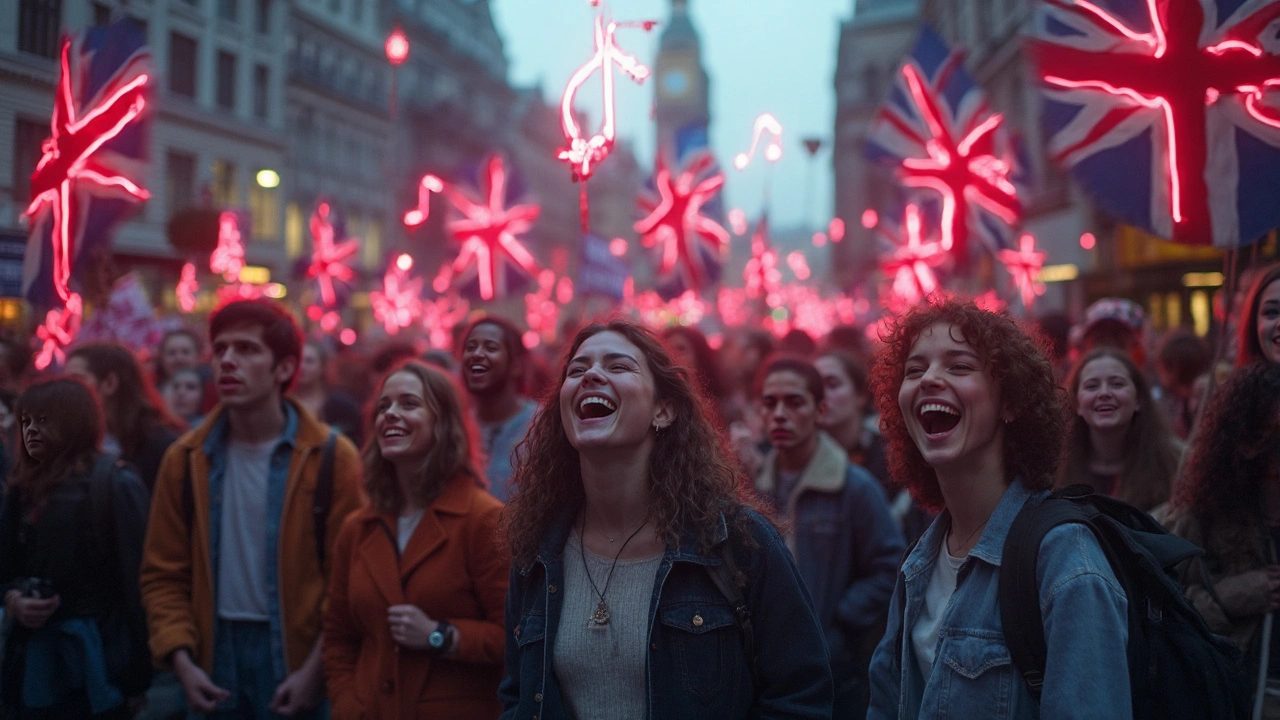Music isn’t just something you blast in the car or at parties—it’s a major player in politics. Pop songs have this wild way of sticking in your head and your heart, and that’s exactly why they’re so powerful when it comes to activism. Ever notice how certain tracks pop up again and again at protests, rallies, or even on your social feed when something big happens in the world? That's no accident.
Throughout history, some of the most unforgettable moments in activism had a soundtrack. These songs didn’t just set the mood—they actually made people pay attention, feel, and act. Today, pop superstars use everything from catchy hooks to bold music videos to push people to care about causes like equality, voting rights, climate, and more. It’s not just talk; their music videos, tweets, and sold-out shows often double as real-life calls to action.
If you’re wondering how you can tell when a pop song is about more than just breakups and fast cars, it’s usually in the lyrics and visuals. Artists use simple but direct lines, symbols, or special guests in their videos to clue you in. And guess what? By streaming these songs, sharing those videos, or even adding them to your playlists, you’re actually helping to spread the message and sometimes, yep, be a part of the movement.
- How Pop Music Joins Social Movements
- Big Moments When Songs Mattered
- Artists Who Won’t Stay Silent
- Your Playlist as a Form of Protest
How Pop Music Joins Social Movements
Ever notice how pop music seems to follow every major protest, rally, or hashtag campaign? That’s because pop music doesn’t just follow trends—it helps set them. When artists drop new singles about big topics, they're often stepping straight into social movements. Their songs get picked up as protest anthems, hashtags, and soundtracks for viral videos. The reach is massive. A song with a message can explode on TikTok or YouTube and end up everywhere within hours.
Take Madonna’s “Like a Prayer” in 1989. It wasn’t just a song—it got people talking about race, religion, and freedom. Fast forward to 2016, when Beyoncé performed “Formation” at the Super Bowl, referencing Black Lives Matter—suddenly, her video and lyrics became talking points on TV and social media. It’s not just the megastars, either. Even smaller artists can go big when their music taps into what people care about.
- Pop music often reaches groups that politics alone can’t touch, like teenagers and even kids.
- Artists hook listeners with catchy tunes, but slip in serious messages about issues like climate, human rights, or elections.
- Streaming services like Spotify and Apple Music let protest songs trend fast, especially when they land on official playlists for social justice or activism.
- Social media means every lyric or video moment can turn into a meme, soundbite, or new hashtag for a movement.
Sometimes, the power of political activism in music even backs up real-life protests. In 2020, H.E.R.’s “I Can’t Breathe” echoed chants from Black Lives Matter marches and landed a Grammy. Stats from Spotify showed protest songs getting millions of daily streams whenever activism news spiked. The point is, artists use their fame as a megaphone—amplifying causes faster than any speech or flyer.
Big Moments When Songs Mattered
There’s nothing quite like seeing a pop music hit fuel a whole wave of political activism. Remember “We Are the World”? Michael Jackson and Lionel Richie co-wrote it in 1985 as a massive charity single to fight famine in Africa. Over 40 pop stars gathered to record it, and the song ended up raising over $60 million—no small feat. It proved people don’t just listen to pop; they act on it.
Fast-forward to 2017, and you’ve got “Praying” by Kesha making serious noise. That song wasn’t just a comeback—it became an anthem during the Me Too movement, highlighting issues of abuse and giving people courage to speak out. When she belted it out at the Grammys that year, surrounded by other women, the moment made headlines everywhere. It was pop music meeting real-world change.
Beyoncé’s “Formation” took things to another level in 2016. The music video was packed with images tied to Black Lives Matter, police brutality, and black pride. She even paid tribute to Hurricane Katrina survivors. When she performed it at the Super Bowl, millions saw pop and politics collide—live and in color.
Even Taylor Swift, often not thought of as political, stepped up before the 2018 U.S. midterms. Her Instagram endorsement of two Democratic candidates in Tennessee caused a huge spike in voter registrations, with Vote.org reporting 65,000 new signups in just 24 hours after her post.
- Pop music rallies people fast—radio, streaming, TV, social media make sure messages travel far and wide.
- Big shows or award performances can bring social issues right into living rooms worldwide.
- Singers with large fanbases help causes get noticed—not in just headlines, but with real money and action behind them.
| Song | Year | Activism Impact |
|---|---|---|
| We Are the World | 1985 | $60M+ raised for famine relief |
| Praying | 2017 | Anthem for Me Too movement |
| Formation | 2016 | Highlighting Black Lives Matter |
| Only the Young (Taylor Swift) | 2020 | Promoted youth voting |
The takeaway? Pop songs really can change what people care about—and sometimes, how they act the next day. Whether you’re hearing them on your phone or in a crowd of thousands, these tunes can make real-world noise.

Artists Who Won’t Stay Silent
Some pop music artists don’t just hit the stage and collect awards—they make real noise for change. When you think of stars who use their fame to do more than sell records, Taylor Swift, Lady Gaga, and Billie Eilish come up fast. They don't shy away from talking politics or jumping in on big issues.
Take Taylor Swift. Remember her 2018 Instagram post urging fans to register to vote? Within 24 hours, over 65,000 people signed up on Vote.org. Her album 'Lover' even took swings at discrimination, especially with the single "You Need to Calm Down" supporting LGBTQ+ rights. Taylor’s shift from silence to outspoken activism is pretty famous now. She’s turned her platform from pure entertainment into a megaphone for causes she believes in.
Lady Gaga is another force. She hasn’t just written anthems like "Born This Way"—which became a rallying cry for self-acceptance and LGBTQ+ pride—she’s also stood onstage to talk about mental health, sexual assault, and more. Remember her Super Bowl halftime performance? She made subtle political statements and later explained her choices, saying she wanted to bring people together through music and action. Gaga even started the Born This Way Foundation to support youth mental health and empowerment.
Billie Eilish brings a younger voice, but she’s just as loud for causes. Her music videos, like "All the Good Girls Go to Hell," mix environmental messages directly in, using bold visuals about climate change. Billie’s spoken at the Democratic National Convention, used her tours to promote voter turnout, and talks about climate action every chance she gets. She doesn’t separate her art from her beliefs.
Here’s a quick look at what some current pop music stars have done for political activism:
- Ariana Grande: Held the 'One Love Manchester' concert, raising millions for charity after the 2017 bombing and speaking up about gun control and mental health.
- Lizzo: Encourages body positivity and voting rights, even registering fans to vote during her concerts.
- Harry Styles: Advocates for LGBTQ+ rights and uses gender-fluid fashion statements to challenge social norms.
A lot of pop stars make their point not only with their lyrics but also by how they show up live, in interviews, and all over social media. If you’re looking for real talk, keep an eye out for artists who address issues head-on and aren’t afraid of backlash. They prove that pop music isn’t just background noise—it can shake things up in the real world.
Your Playlist as a Form of Protest
Most people think protest looks like a crowd waving signs, but honestly, blasting the right pop music can be just as loud. Your playlist isn’t just background noise—it’s your little megaphone. When you stream or share tracks by artists pushing for social change, you help them reach more ears and climb the charts. That sends music labels and the industry a clear signal: people care about these issues.
Look at what happened in 2020. Spotify reported a 239% increase in user-created protest playlists in the days after George Floyd’s death. Songs like H.E.R.’s “I Can’t Breathe” and Childish Gambino’s “This Is America” shot back up in streams, and everyone—from teens in their bedrooms to big celebrities—started linking these tracks to posts about activism. Pop songs shape the mood of movements, from #MeToo to climate strikes.
Want to turn your playlist into a small act of political activism? Here’s what helps:
- Watch for songs dropped around election seasons or big moments—they’re often packed with hidden (or not-so-hidden) messages.
- When an artist posts about a cause, check out their recent releases. See if their music lines up with what they’re fighting for.
- Create your own protest playlist and share it. Platforms like Apple Music, Spotify, and YouTube all have public playlist features—use them to boost protest songs or anthems with a message.
- Stream and share music from smaller artists too, not just the big names. Their impact adds up with every play.
Your little playlist might seem like a drop in the bucket. But those drops add up. According to Spotify, when “Alright” by Kendrick Lamar became an unofficial protest anthem, it saw a 71% spike in daily plays during social justice marches. Major brands and networks noticed, leading to even more coverage of both the artist and the issues.
| Protest Song | Year Released | Impact |
|---|---|---|
| "Fight Song" by Rachel Platten | 2015 | Adopted by politicians and marches for empowerment |
| "Born This Way" by Lady Gaga | 2011 | Became an LGBTQ+ rights anthem played globally |
| "This Is America" by Childish Gambino | 2018 | Sparked debates on race, policing, and violence |
Bottom line: your playlist is your platform. Every time you hit play, you tell the world what matters to you—and you never know who’s listening or where that message will end up.

